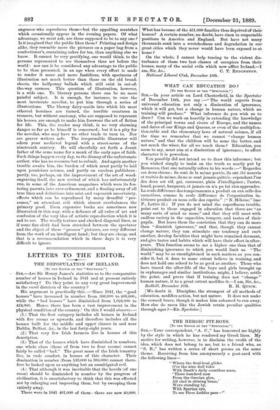WHAT CAN EDUCATION DO? -
[To THE EDITOR OP THE "SPECTATOR."]
SIE,—In your article on Lord Chesterfield, in the Spectator of December 14th, you say :—" The world expects from universal education not only a diminution of ignorance, which it will get, but a change in human nature, which no- training will produce." What inference do you wish us to draw P Can we work on heartily in extending the knowledge of the principal towns and rivers of Europe, and the names and dates of our Kings and Queens, or even of the multiplica- tion-table and the elementary laws of natural science, if all the time we remember that we cannot "change human nature," and that the children will be none the better, and not much the wiser, for all we teach them ? Education, you seem to say, must aim at a diminution of ignorance ; to affect character it is powerless.
You possibly did not intend us to draw this inference ; but you wished simply to insist on the truth so neatly put by Rousseau, that one naturally refers to his words :—" Regardez ces deux chiens ; ils sont de la meme portee, ils ont ete nourris et traites de mime, ils ne se sont jamais quittes: cependant l'un des deux est vif, gal, caressant, plein d'intelligence ; l'autre, lourd, pesant, hargneux, et jamais on n'a pu lui yen apprendre. La seule difference des temperaments a produit en eux celle des caracteres, comme la seule difference de l'organisation in- terieure produit en nous celle des esprits." (" N. Heloise," 5me P., Lettre If you do not mind the superfluous trouble, point out to those engaged in education that there are "as many sorts of mind as moss," and that they will meet with endless variety in the capacities, tempers, and tastes of their pupils. But leave them the conviction that they can do more than "diminish ignorance," and that, though they cannot change nature, they can stimulate one tendency and curb another, develop faculties that might have remained dormant, and give tastes and habits which will have their effect in after- years. This function seems to me a higher one than that of diminishing ignorance to which you would limit us. "The world" may be as unenlightened in such matters as you con- sider it, but it does to some extent believe in training, and does not hold one school to be as good as another. Those who. have traced the after-life of the boys and girls brought up in orphanages and similar institutions, might, I believe, settle the point, and prove that if training does not " change '" human nature, it to a great extent modifies it.—I am, Sir, &c., [We doubt it. Discipline, the strongest of all methods of education, modifies action, but not nature. It does not make the coward brave, though it makes him ashamed to run away. How else do races like the Jewish retain peculiar qualities through ages ?—ED, Spectator.]










































 Previous page
Previous page